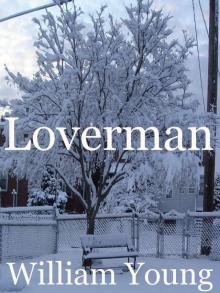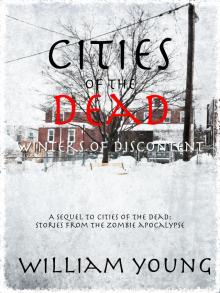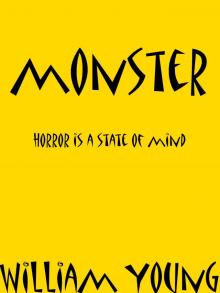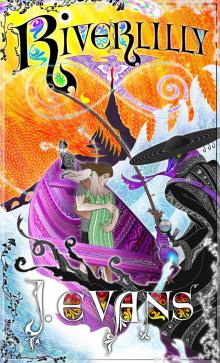- Home
- William Young
The Third Time is the Harm (Cities of the Dead)
The Third Time is the Harm (Cities of the Dead) Read online
The Third Time is the Harm
by William Young
Copyright 2011 William Young
Chippewa Falls, Wisconsin - Day 654
Malcolm Kempf worked his way along the hillside, keeping his eyes on the band of shuffling undead trudging down the road. For months, little groups of zombies had been making their way into Chippewa Falls, slowly forming in the Northern Wisconsin State Fairgrounds into a gaggle that resembled the swaying of tall grass on a windy day. Malcolm had no way of knowing why that location drew them. At first, he surmised it had to do with the proximity to the Calvary, Hope and Forest Hill cemeteries and all of the potential new recruits in their graves. And then he had made his way around those cemeteries and realized not a single grave had been disturbed. Anyone buried in them was still below ground. Whatever had killed and resurrected the undead had no effect on the previously dead.
He sighted his compound bow at the trailing zombie and watched it over the tip of his arrow, feeling the gentle breeze and compensating for windage. An arrow through the skull would drop it to the ground and the others wouldn’t know they’d lost a member of their group. On the other hand, if he shot it with the Desert Eagle strapped to his hip, the entire group would turn on him, and every zombie within hearing range of the report would start shuffling his way.
He relaxed the tension on the bow and stowed the arrow into his belt quiver, watching the undead shuffle off around a bend in the road. He picked up the three rabbits he’d bagged earlier in the afternoon, keeping his eyes alert for any errant undead that might have found its way into the backwoods. For whatever reason, the walking dead didn’t often find their way off the beaten path.
“You’re getting pretty good at that, but you messed up and established a rhythm, Eli,” Malcolm said, turning his head over his right shoulder and smiling at his 14-year old son. “Remember to step carefully when you walk through the forest and to change your step pattern ever-so-slightly as you do so that the noise your feet make always sound like the vagaries of nature, not the patterns of a creature.”
Eli rolled his eyes and quickened his pace to match his. “I so thought you were going to put an arrow in that fat zombie chick’s head, Dad, but then you didn’t. What happened? You had the bow drawn and ready.”
Malcolm harrumphed low and shrugged. “I don’t know; just didn’t think there was a point to it.”
“I thought we wanted to kill all the zombies.”
“We do.”
“But you didn’t take the shot.”
“I know.”
“Why not?”
“I don’t know. I just didn’t.”
Their compound was a mile into the woods from the road. It was a former farm that had stopped being a farm sometime in the 1950s or 1960s, judging from the leftover equipment still inside the barn. The house had been boarded up sometime after farming had stopped, and forgotten. Until Malcolm and his group came across it while living in the woods after escaping the city earlier that first year. Nature had recaptured much of the farmland in the decades since it had been abandoned, but with some effort and creativity, Malcolm had planted an acre with a variety of crops. There was a chicken coop, two dairy cows and a half-dozen pigs, as well. They hadn’t eaten any of the farm animals, yet, although there was fresh milk and eggs.
“What’d’ja get?” Nancy asked as father and son walked into the kitchen.
Nancy was Malcolm’s fiancée. They would have been married by now had there been no zombie apocalypse. They wore their rings anyway, figuring there might never be any “authority” to marry them, having pledged themselves to each other five months ago in front of his son, longtime friends Roy and Sara Campbell and their two daughters.
“Three rabbits are out on the stoop, Nance,” Malcolm said, closing the distance and kissing her. “Undead were all over the streets today, making their way for town, so didn’t want to risk it to get more.”
“Rabbits, huh? Haven’t had those in a couple of weeks,” Nancy said, smiling and rolling her eyes.
He smiled back. “There’s only three of them, so I’m gonna guess we’re gonna have a lot of potatoes and carrots with ‘em.”
“One of these days, we’re gonna find out what the hell happened.”
Malcolm looked over at Roy. They were sitting in the barn at “the bar,” drinking home brew. Roy’s passion from before the end of times had been making beer in his basement, small batches of whatever recipe entertained his fancy. Malcolm had always thought Roy’s hobby pre-apocalypse had been too labor-intensive, but now he was glad they had spent those days the previous summer scavenging for the equipment he needed. “Beer is food,” Roy had said to settle the argument about how to provision their farm.
“I dunno ‘bout that, Roy,” Malcolm said. “There hasn’t been a government to speak of since the last of the National Guard boys pulled out with the police and that convoy of school buses last year. And it’s not like we get people moving into the area that could tell us anything. Everyone I come across is headed south before the winter. We might be stuck in this world for a long time.”
Roy nodded. “You know, when I used to think about life with no government, I never really meant zero government. I like to think that we’d have had the kinda government that could actually take care of a zombie problem, deliver the mail, fix the streets and do your basic police and fire work,” Roy said. “But, then, I shoulda known that if government couldn’t deliver the mail or fix the streets, it was never goin’ to be worth a shit with dealing with the undead.”
“On the upside, there’s no taxes anymore.”
“Yeah, there’s that,” Roy said, a wry smile accompanying a roll of his eyes.
They both sipped their beer for a while in silence, each man inside his own head. Almost like when they would go fishing and not talk for hours, just sit there in the boat casting, reeling in walleye or perch. You didn’t need to talk to each other when you both knew what to do. They had rebuilt the farm largely in silence, too. Each man had taken over a specific aspect, Roy working on the structures and Malcolm on the livestock and garden, each man working to his strengths, helping each other when necessary. Sara and Nancy had gravitated equally naturally to the cooking and family-raising aspects of life, and though life was significantly more difficult absent everything technological that humanity had done to make life easier, they were, for the most part, happy.
Except for the kids. Life without cell phones had totally demoralized Roy’s daughters, which confounded Roy since there was nobody to talk or text. Eli occasionally despaired over his inability to play on a PlayStation 3. The sudden descent from modernity had shocked the three teenagers in ways their parents hadn’t imagined, and Malcolm got the sense that the kids felt they had been robbed of some birthright. They did their chores around the farm without too much complaining, but it was obvious they expected things to return to normal at some point. None of them expected the world to remain two-hundred years in the past for long.
It didn’t help that they weren’t without modern conveniences. The group had several solar powered battery chargers which they used to recharge the batteries to the walkie-talkies, GPS devices, mp3 players and assorted other electronic gadgets they had on the farm. Rechargeable batteries were still rechargeable and the crank-handle emergency radios they had could still - on a clear night - pull in a signal from somewhere from some lonely soul who was broadcasting on a ham set. They all knew they weren’t alone, that there was still life out there on the fringes.
“Eli wants to see if we can take a cow from that dairy farm off County Highway S,” Malcolm said.
“We already have two.”
“He wants to eat it.”
“Are they still worth eating? Last time we went by there the few that were around to look at were pretty skinny.”
“He wants a hamburger,” Malcolm shrugged. “I’d like a steak, come to think of it. Rabbit, deer and turkey are getting kind of old.”
“Ayup,” Roy said. “Lots of dead ones around.”
Malcolm nodded.
“I don’t know that we should be risking our young on hamburger. Not with so many of the undead so close to that place.”
“I ain’t arguing in favor of it, I’m just sayin’ maybe it’s worth considering,” Malcolm said. “We could scout it and make a decision then.”
“The last two times we tried something like that we nearly got eaten alive by the dead walkers,” Roy said. “I think we should just stay put, stay out of the way, and learn to like living in the 1800s.”
“We ain’t going to live long that way,” Malcolm said, thinking about the prospects. “And our teeth will fall out.”
The sun outside had set, and the small propane lamp sitting on the floor between them cast a circle of light around their legs, exaggerated shadows and made them realize the direness of their current situation. Each man finished his beer and went to bed. The night watch

_preview.jpg) Waiting for the Great Leap Forward (Cities of the Dead)
Waiting for the Great Leap Forward (Cities of the Dead)_preview.jpg) Days Go By (Cities of the Dead)
Days Go By (Cities of the Dead)_preview.jpg) All Hell Breaks Loose (Cities of the Dead)
All Hell Breaks Loose (Cities of the Dead) The Signal
The Signal_preview.jpg) The Third Time is the Harm (Cities of the Dead)
The Third Time is the Harm (Cities of the Dead)_preview.jpg) The Lazarus Question (Cities of the Dead)
The Lazarus Question (Cities of the Dead)_preview.jpg) What are Little Zombies Made of? (Cities of the Dead)
What are Little Zombies Made of? (Cities of the Dead) Loverman
Loverman Cities of the Dead: Winters of Discontent
Cities of the Dead: Winters of Discontent_preview.jpg) Death Takes a Holiday (Cities of the Dead)
Death Takes a Holiday (Cities of the Dead) Monster
Monster_preview.jpg) The Undeath of Rob Zombie (Cities of the Dead)
The Undeath of Rob Zombie (Cities of the Dead) Riverlilly
Riverlilly_preview.jpg) Killing Country Music (Cities of the Dead)
Killing Country Music (Cities of the Dead)